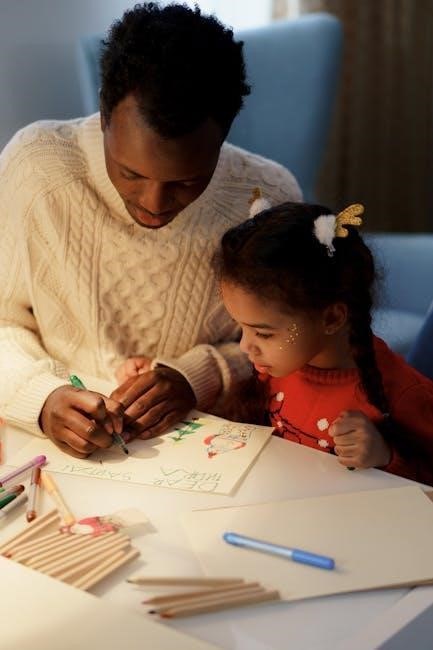spiritual gifts test for youth pdf
Spiritual gifts are supernatural abilities given by the Holy Spirit to empower individuals for service and growth in faith. These gifts help youth connect with God’s purpose.
Understanding Spiritual Gifts in a Youth Context
Spiritual gifts in a youth context are divine abilities that empower young people to serve and grow in their faith. These gifts, given by the Holy Spirit, help youth identify their unique roles in God’s plan. By understanding these gifts, young individuals can connect their passions and talents with meaningful service. The spiritual gifts test for youth is a tool designed to guide teenagers in discovering their strengths, fostering a deeper relationship with God. It emphasizes that spiritual gifts are not about competition but about fulfilling their purpose in a faith community. This understanding helps youth embrace their identity and contribute positively to others.

The Purpose of a Spiritual Gifts Test for Youth
The purpose of a spiritual gifts test for youth is to help them discover their unique gifts, understand their role in ministry, and grow in faith.
Helping Young People Identify Their Spiritual Gifts
Helping young people identify their spiritual gifts involves guiding them through self-discovery and understanding their unique abilities. A spiritual gifts test for youth is a valuable tool, providing insights into how they can serve others and grow in faith. The test typically includes a series of questions that assess their strengths, interests, and experiences. It’s important for youth to answer honestly, reflecting on their passions and how they’ve been used by God in the past. Leaders and mentors can help interpret results, offering guidance on how to develop these gifts. This process fosters a deeper connection to their faith and encourages meaningful contributions to their community.
How the Spiritual Gifts Test for Youth Works
The test evaluates spiritual gifts through a series of questions, assessing strengths, interests, and experiences. It covers 20-26 gifts, helping youth discover their unique abilities for service and growth.
A Step-by-Step Guide to Taking the Test
Read each statement carefully and select the option that best reflects your feelings or experiences. This helps assess your strengths and spiritual interests. 2. Answer honestly, without overthinking, to ensure authentic results. 3. Complete all questions, as each contributes to identifying your gifts. 4. Use the provided scoring sheet to tally your responses and determine your top gifts. 5. Reflect on the results to understand how your gifts align with your faith journey and service opportunities. This process is designed to be straightforward, guiding you to discover and apply your spiritual gifts effectively.

Key Spiritual Gifts Identified in the Test
The test identifies gifts like mercy, evangelism, hospitality, and teaching, helping youth understand their unique abilities for serving and growing in their faith journey effectively.
Exploring the Most Common Spiritual Gifts for Young People
Among young people, common spiritual gifts include mercy, evangelism, hospitality, and teaching. These gifts reflect their natural talents and passions, guiding them to serve others effectively. Mercy allows them to show compassion, while evangelism drives them to share their faith. Hospitality encourages community building, and teaching helps them inspire others. These gifts are often identified through surveys and tests, providing clarity on how they can contribute to their faith communities. Understanding these gifts empowers youth to use their unique abilities in meaningful ways, fostering personal and spiritual growth.
Interpreting Test Results
Test results reveal spiritual gifts like mercy, evangelism, or teaching, guiding youth to understand their strengths. Scores help identify how to use these gifts for faith growth and service.
Understanding Your Spiritual Gifts Profile
Your spiritual gifts profile, generated from the test, highlights strengths like mercy, evangelism, or teaching. It evaluates 20-26 gifts, providing a personalized overview. The profile isn’t definitive but serves as a guide to help youth identify areas where they excel. Scores are based on responses, offering insight into how God may be calling them to serve. Mentorship and reflection are key to refining this understanding. The profile encourages young people to explore practical ways to apply their gifts in faith communities and beyond, fostering growth and purpose.
Using the Test to Grow in Faith
Discovering your spiritual gifts through the test helps identify strengths and passions, guiding practical applications in ministry and daily life, fostering spiritual growth and purposeful service.
Practical Steps for Applying Your Spiritual Gifts
Identify your spiritual gifts through the test and reflect on how they align with your passions and strengths. Seek guidance from mentors or leaders to understand how to use these gifts effectively. Volunteer in areas that match your gifts, such as teaching, serving, or evangelizing. Practice humility and openness to the Holy Spirit’s leading. Collaborate with others to amplify your impact in ministry or community service. Regularly pray for wisdom and courage to apply your gifts faithfully. Share your experiences and encourage others to discover and use their spiritual gifts as well. Consistently seek growth and accountability to fulfill your purpose in God’s plan.

Examples of Spiritual Gifts in Action
Youth use their gifts in worship, teaching, serving, or mentoring. Many share their talents in church activities, volunteer work, or community projects, inspiring others with their faith.
Real-Life Stories of Young People Using Their Gifts
Many young people have discovered their spiritual gifts through tests and actively use them in meaningful ways. For example, a teen with the gift of teaching leads Bible study classes for younger kids. Another youth, gifted in hospitality, organizes community meals to bring people together. A young leader with the gift of evangelism started a prayer group at school, inspiring peers to deepen their faith. These stories show how identifying spiritual gifts empowers youth to serve others and grow in their relationship with God. Their experiences highlight the transformative impact of using these gifts in real-world contexts.
Nurturing Spiritual Gifts in Youth
Nurturing spiritual gifts in young people involves guidance from parents, mentors, and leaders. Encouraging their growth helps them serve others and deepen their faith effectively.
Guidance for Parents, Mentors, and Leaders
Parents, mentors, and leaders play a crucial role in nurturing the spiritual gifts of youth. Encouraging participation in spiritual activities, providing resources like the Spiritual Gifts Test for Youth, and fostering a supportive environment helps young individuals identify and develop their gifts. Leaders can create opportunities for service, allowing youth to apply their talents in practical ways. Mentors should offer guidance, helping them understand their strengths and how to use them for God’s purpose. By prayerfully supporting and equipping the next generation, adults can empower youth to thrive in their spiritual journeys and make a meaningful impact in their communities.

The Impact of Spiritual Gifts on Community Involvement
Spiritual gifts empower youth to serve others, fostering meaningful community involvement. Their unique talents drive positive change through volunteering, mentoring, and outreach, strengthening faith and inspiring others.
How Young People Can Serve Others with Their Gifts
Young people can serve others by using their spiritual gifts to meet community needs. Those with the gift of mercy can volunteer at shelters or hospitals. Evangelism gifts can be used in outreach programs or sharing faith stories. Hospitality gifts inspire organizing events or mentoring peers. Teaching gifts can translate into leading Bible studies or creating educational content. Leadership and service gifts empower organizing community projects or youth groups. By aligning their gifts with local needs, young people can make a meaningful impact, fostering positive change and inspiring others to serve. Their contributions strengthen communities while deepening their own faith and purpose.